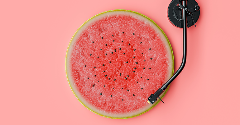News
Sweetness From Nature – Megatrend Versus Mainstream Business
22 Oct 2013“All natural” is a megatrend in the ingredient industry these days. Many new innovations are taking place throughout the whole ingredient value chain – from farming and manufacturing through to the product formulators and the FMCG marketers. The trend is being closely observed by both industry experts and consumers. More than half of all sweetener […]

“All natural” is a megatrend in the ingredient industry these days. Many new innovations are taking place throughout the whole ingredient value chain – from farming and manufacturing through to the product formulators and the FMCG marketers.
The trend is being closely observed by both industry experts and consumers. More than half of all sweetener discussions in the media, both in traditional and social networks, relate to stevia (58%), in contrast to aspartame (28%) or sucralose (14%). The high communication activity, especially in social networks and online forums, reveals that the natural sweetener concept is often not fully understood. When consumers’ perceptions were tested, Canadean Ingredients found that 79% of consumers knew that stevia is natural. However, 43% and 49% also believed that aspartame and sucralose were natural.
If an ingredient label lists “steviol glycosides from the stevia plant” or “sweetener: E960”, it can be expected to be interpreted differently by the average consumer. The situation is that many consumers do not interpret E numbers as a safety check, but instead interpret it to be that an ingredient with an E number is highly processed and risks being unsafe. Whether the interpretation is natural or synthetic, there is still a long way to go for a mainstream consumer product breakthrough.
Today, 2% of the global consumption volume of low calorie sweeteners in soft drinks is derived from stevia. In the North America and Europe market, 3.2% of non-caloric sweetener consumption is stevia-based. Although the consumption of global soft drinks with natural sweeteners in 2012 is small, it is constantly growing.
When calculating consumption based on the sweetness index, it is apparent that traditional sweeteners still have a significant impact within the soft drinks industry. One of the main reasons for this can be found in the more polarised consumption patterns of Western markets, which influence ingredient decisions for many new soft drink formulations. Consumers are less likely to consume sweetened carbonates (2010-2012 CAGR 2.04%) compared to bottled water (2010-2012 CAGR 6.39%), and they are even less likely to drink natural sweeteners that may be added to juices (2010-2012 CAGR minus 1.05%).
Today, many consumers are moving to drinks containing high sugar, such as energy drinks (2010-2012 CAGR 14.07%). This means they are embracing the less natural profile of these beverages, especially when they are offered as low-caloric versions, as they largely contain synthesised-intense sweeteners. Over the last three years, aspartame consumption in energy drinks grew nearly 20% in North America and 6.5% in Europe.
In 2012, sweetness consumption in energy drinks for all low caloric sweeteners was 325 MT (totalling a nutritional burden of zero calories) and non-caloric sugar types more than 1.1 million MT (totalling a nutritional burden of consuming 4.4 mio kcal). One might ask if this could become a new hot topic on the agenda for nutritional watch dogs.
Each consumer is different in terms of his or her idea of a perfect healthy lifestyle; it can be quite complex, as there are many different views of what is right and wrong/healthy or unhealthy for them. Today, health-conscious consumers may be seen drinking carbonates with normal sugar on a perfectly balanced and rational basis, and then there are other consumers who seem to be living a healthy lifestyle but indulge in high carb energy drinks or other performance beverages. Consumers may be drinking fruit-based carbohydrates, believing this is the healthier choice because of the lack of processed ingredients.
This contradiction between processed ingredients, nutrition and health may be due to groups of consumers’ mistrust in the industry. The main reason for the natural megatrend could well be that less-processed products are considered healthier amongst urbanised Western consumers, who have a romantic dream of foraging for their own food in the wild and growing their own vegetables. Many consumers expect the modern supermarket to be offering choices of healthy, natural products with origin declarations.
When comparing consumers’ attitudes in 2012 versus 2013, we saw there was no change in consumers’ perception of what is the healthiest choice in terms of sweetening agents, as the majority (47% in 2012 and 48% in 2013) still think that honey is the healthiest. However, the number of consumers believing sucralose is the healthiest sweetener has decreased from 16% in 2012 to only 4% in 2013, meanwhile the perception of stevia as the healthiest choice of sweetener has changed in a positive direction – from 9% in 2012 to 14% in 2013.
So the natural trend is booming – but as a mainstream business for the industry, it is still somewhat out in the future in terms of revenues. Consumers take information on board, but slower than industry has anticipated (or predicted).
Related news

Retail landscape lacks nutritious and affordable food, says ATNi
30 Dec 2025
A rapid increase in modern food retail has given retailers growing influence over consumer diets, according to global non-profit ATNi’s latest assessment.
Read more
Debate over ban on ‘meaty’ names for plant-based products reaches stalemate
26 Dec 2025
The debate over a ban on plant-based products using “meaty” terms has reached a stalemate, leaving manufacturers in limbo and still facing overhauls to their marketing and packaging.
Read more
Multi-sensory food and drink products to gain traction in 2026
16 Dec 2025
Trend forecasters predict that sensory elements will play a larger role, helping food and beverage brands differentiate themselves in a competitive market in 2026.
Read more
Big appetite for M&A between European and US food and drink companies
3 Dec 2025
Persistent tariffs on EU food and beverage exports have helped drive record levels of M&A activity between European and US companies this year, according to analysis by ING.
Read more
Non-UPF Program extends certification scheme to entire food industry
30 Nov 2025
The Non-UPF Program has extended its certification scheme to the wider food sector, championing a move towards healthier consumption habits.
Read more
Lancet study links UPFs to chronic disease risk
26 Nov 2025
UPFs are consistently associated with an increased risk of diet-related chronic diseases, according to a comprehensive review of global evidence in The Lancet .
Read more
Concerns swirl around cinnamon’s compliance with EU law
25 Nov 2025
Cinnamon may be a top functional ingredient, but it needs stronger protocols to ensure it meets EU food safety laws and quality standards, say researchers.
Read more
Oat Barista: Innovation for game-changing beverages
20 Nov 2025
Oat Barista is a clean label, sustainable, and innovative drink base specifically designed to create the perfect foam in one single ingredient.
Read more
How younger consumers are redefining ingredient choices and rejecting brand loyalty
18 Nov 2025
Gen Z and millennial consumers’ preferences for transparency, functionality, and purpose are “redefining the very nature of consumption itself”, says SPINS.
Read more
Hybrid formats and flexible positioning to disrupt category norms in 2026
17 Nov 2025
Trend forecasters expect food and drink to move more fluidly across occasions, functions, and formats as consumers seek versatility, novelty, and convenience.
Read more